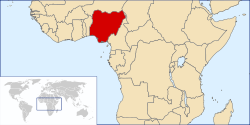Yoruba identity in Nigeria
Colonial formation of local ethnicity: the case of the Yoruba in Nigeria
Some observations:
- Pattern: social internalization of external social grouping imposed by more powerful culture, absorbed as a hegemonic internalized structure.
- Constructions of ethnicity, implying a degree of homogeneity, often result from an outsider perspective, since the "homogeneity" of an "ethnic group" is only "visible" from the outside.
- When the "outside" is powerful (i.e. colonialism, imperialism), the outside--vested in special interests--becomes the hegemonic insider perspective, though not without resistance.
- Such homogenization is a useful tool for governance, colonial or otherwise, and its use often occurs within positions of power.
- Thus the operation of "othering", when carried out from a position of superior power, may become a primary source of identity. Yet such identities, once internalized, can also be revised to serve new ends, e.g. transformed into a tool of colonial resistance.
